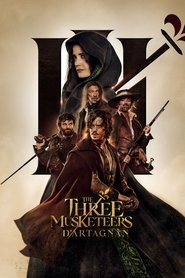Whether they come from Hollywood or «le Hollywood», the success of any ensemble action movie relies on balancing a familiarity with the individuals and an affection for the group as a whole. Unfortunately, neither of these is achieved successfully in this film; any distinguishing features between the four immediately dissolves once introduced — including, I should note, the implication that Borthos is gay. Ultimately, none of the pretended differences between the Musketeers has any bearing on the plot, and so their camaraderie (ie. the very thing you want a 'Musketeers' movie to provide) is simply an atomised group of interchangeable avatars.
This becomes obvious in both of the film's key moments. First, in the scenes where Athos is being taken to the scaffold for a crime he did not commit, the excessively 'epic' music simply underscores that the viewer is not invested in Athos as a person and won't care that his frères d'armes will be broken up as a result of this apparent injustice. And the inevitable addition of D'Artagnan to the Musketeers at the end of the film fails to land as a personal victory for him nor a success for the group as a whole.
Politically, the film isn't stuck in the 1620s or even the 1844 of Dumas' novel, but actually in the late 2000s: it gestures at post-9/11 ideas about sectarianism, religious extremists, black ops, crusades and the targetted assassination of political leaders, but doesn't make any attempt to evince a connection to contemporary events. There's a little bit of the 'girlboss' about some of the women as well, but it is shown as being a flimsy pretence once any fighting starts, so the honneur of our four fellows is not infringed.
Touching on their honour, though, the film also tries to have it both ways with the near-explicit suggestion that Borthos is gay. In a tavern scene straight out of The Lord of the Rings, Borthos leaves D'Artagnan in no doubt that he is gay but never actually comes out and says it. Of course, he wouldn't be flirting with D'Artagnan if he did so, but the crucial point is that the film does absolutely nothing with that dimension of Borthos' life beyond that point — curious to learn that "don't ask, don't tell" (repealed in the US in 2011) was around in the seventeenth-century as well. Queer readings of classic narratives have a long history in academia, and this non-Hollywood film had the opportunity to attempt something that would appear fresh to a mainstream audience, so it's a shame to see yet another superficially queer character in a movie that presents no challenge whatsoever. On the other hand, there is surely nothing more 2020s than a piece of media that simultaneously courts the 'rainbow dollar' but also wishes to generate column inches from those who will cry that the Musketeers have 'gone woke'.
Still, the most enjoyable parts of this attempt to create a Francophile Game of Thrones are its swordplay and its stonework, rather than court intrigue or homosocial group dynamics. Indeed, the fight scenes had real weight and heft to them, the handheld camerawork conveying a convincing sense of visceral brutality. Even the film's regrettable reliance on firearms to resolve power differentials was offset by a real sense that their bullets actually hurt; perhaps an influence from revisionist postmodern Westerns such as Deadwood. The net result is that, despite being relatively bloodless, the fight scenes had a 'realness' to them which was matched by the surrounding masonry and rain, the latter of which puts The Three Musketeers: D'Artagnan in a long-tradition of mid-budget 'realist' period pieces from mainland Europe such as Brotherhood of the Wolf (2001) and Perfume (2006).
Indeed, no doubt as much of this movie's €36 million budget was spent on dry-cleaning all that mud off the costumes as it was in securing the rights to film in front of all that lovely architecture. I can tell it wasn't spent on the music — not only was the 'original' soundtrack far from original, I chuckled when we heard a dance by French composer Jean-Baptiste Lully (born about a decade after the events portrayed) at the Duke of Buckingham's 'English' manor.
Synopsis: D'Artagnan, a spirited young Gascon, is left for dead after trying to save a noblewoman from being kidnapped. Once in Paris, he tries by all means to find his attackers, unaware that his quest will lead him to the very heart of a war where the future of France is at stake. Aided by King's Musketeers Athos, Porthos and Aramis, he faces the machinations of villainous Cardinal Richelieu and Milady de Winter, while falling in love with Constance, the Queen's confidante.

